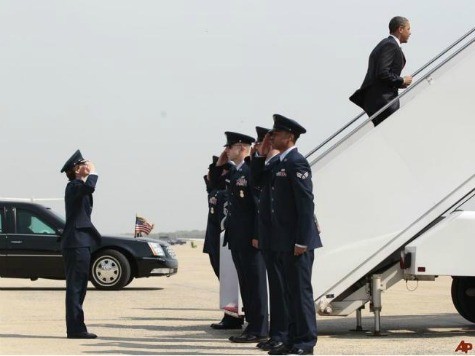For weeks, rumors have flown about a “purge” of senior military officers by the Obama administration. The tone was set in 2010, when President Barack Obama fired General Stanley McChrystal, the commander of U.S. forces in Afghanistan, over insults about the president and vice-president attributed to him in a profile by the late Michael Hastings in Rolling Stone. Lately, a rash of firings has fueled suspicions of a vendetta.
Those suspicions, in turn, reflect a widely known open secret: Obama is not well-liked, in general, by the military. Partly that is because the military tends to be conservative, and to vote Republican. But it is also because of the way in which the president has used the military as props in his political campaigns while showing little real concern for the welfare of the troops or their success in the field of battle.
The most recent example was President Obama’s response to the Navy Yard shootings in September. Even as the attack was ongoing, Obama held a campaign-style speech to mark the fifth anniversary of the collapse of Lehman Brothers. He mentioned the shootings at the outset of his remarks, then launched into a partisan attack against his opponents. The White House said that he never considered postponing the event.
The paradigmatic example, of course, is the Benghazi terror attack, when the Obama administration failed to intervene to save the lives of diplomats and security personnel overseas, including former Navy Seals. The president was not in touch with his national security team throughout the evening, and flew to Las Vegas the next day for a fundraiser. His administration spent days blaming an obscure YouTube video for the attack.
While Democrats have lately convinced themselves that they can best “support the troops” by bringing them home from foreign wars, the truth is that many people join the military because they want to fight. Many relish the opportunity of deployments, and those on the front lines want to be equipped with the best tools to win–which means not only the most best weapons and personnel, but reasonable rules of engagement.
The arbitrary deadlines for withdrawal in Afghanistan; the precipitous pullout from Iraq after all the hard-won gains there; the sequester cuts, which were first proposed by the White House–all have contributed to a sense that the president does not care about the military. Resentment against Obama is not universally shared in the ranks–he has some vociferous supporters–but it is certainly palpable on military bases.
The Obama administration’s latest initiative is to curb sexual assault in the military. Though concern about the problem is shared by members of both parties, Democrats are pushing for accusations to be handled outside the normal chain of command. There is little evidence that such a change is necessary. It would, however, increase the administration’s ability to monitor what goes on more generally in military units.
The Obama administration is also clamping down on religious expression in the ranks. Earlier this year, Breitbart News’ Ken Klukowski reported that the Pentagon, advised by an anti-religious consultant, could make certain kinds of evangelization punishable by court-martial. At the same time, the White House refused for years to acknowledge that the Fort Hood shootings of 2009 were an Islamist terror attack.
It is bad for the military, and the country, if the armed forces are perceived as the unique province of white Christian conservative males, who might use the chain of command to coerce others to embrace their own beliefs. That perception already exists in many parts of the country, and arguably damages recruitment. Yet the answer is to strengthen the military’s own code and its enforcement–not a campaign of repression.
The Obama administration’s treatment of the military suggests it is less interested in improving the institution than in stamping out political opposition within the ranks. It refusess to recognize that there is a natural conservatism–even among liberal soldiers–in an institution that must value strength, merit, and tradition if it is to succeed in its basic objectives. The changes risk throwing out the good with the bad.

COMMENTS
Please let us know if you're having issues with commenting.